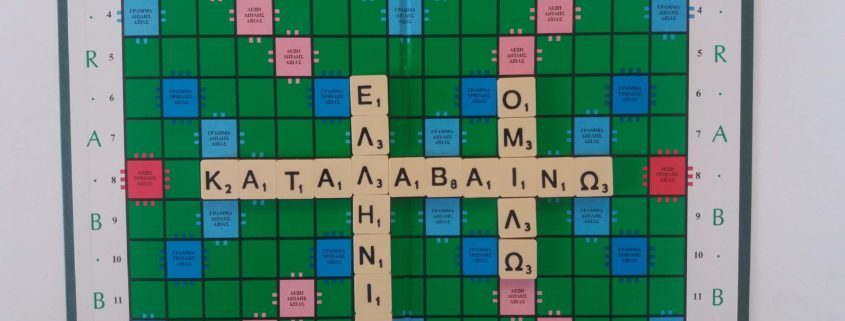One of your main purposes while learning Greek is to understand Greeks or to be able to communicate in Greek. The verb ‘to understand’ in Greek might seem a long word, but it’s one of the first verbs you will learn in order to specify your degree of comprehension or to declare if you understand something or not.
For example:
• Kαταλαβαίνεις ελληνικά; Do you understand Greek?
• Kαταλαβαίνω ελληνικά πολύ καλά. I understand Greek very well.
• Kαταλαβαίνω λίγο ελληνικά. I understand a bit of Greek.
• Δεν καταλαβαίνω. I don’t understand.
• Δεν καταλαβαίνω τίποτα. I don’t understand anything.
The verb ‘καταλαβαίνω’ means ‘to understand, to perceive, to grasp’.
It belongs to the first group of verbs you learn to conjugate at your first lessons in Greek, which is type A, like ‘μένω’ (to stay) and ‘κάνω’ (to do/make). The verb is conjugated in the present tense by adding the endings -ω, -εις, -ει, -ουμε, -ετε, ουν(ε) to the stem καταλαβαίν-.
In the simple past and simple future tenses, however, the respective endings are attached to the stem καταλαβ- [see the table below].
| Present | Future Simple | Past Simple | |
| εγώ | καταλαβαίνω | θα καταλάβω | κατάλαβα |
| εσύ | καταλαβαίνεις | θα καταλάβεις | κατάλαβες |
| αυτός, αυτή, αυτό | καταλαβαίνει | θα καταλάβει | κατάλαβε |
| εμείς | καταλαβαίνουμε | θα καταλάβουμε | καταλάβαμε |
| εσείς | καταλαβαίνετε | θα καταλάβετε | καταλάβατε |
| αυτοί, αυτές, αυτά | καταλαβαίνουν(ε) | θα καταλάβουν(ε) | κατάλαβαν / καταλάβανε |
If you just started learning Greek, you can take a look at the video of the Omilo teacher and listen to the correct pronunciation of the conjugation in the present tense.
For the more advanced learners in Greek:
Let’s have a look at some examples that will help you understand the range of use of this verb. Some idiomatic expressions with the verb ‘καταλαβαίνω’ follow.
Example of Sentences :
Καταλαβαίνω πολλές λέξεις στα ελληνικά, αλλά είναι δύσκολο να μιλάω.
I understand many words in Greek, but it is difficult to speak.
Δεν κατάλαβα τι είπε, μιλάει πολύ γρήγορα.
I didn’t get what he said, he speaks too fast.
Το μάθημα πέρασε χωρίς να το καταλάβουμε.
The lesson went by without realizing it (i.e. very fast or very easily).
Κατάλαβε το λάθος του και ζήτησε συγγνώμη.
He recognized his mistake and apologized.
Η γιαγιά μου δεν καταλαβαίνει από υπολογιστές.
My grandmother knows nothing about computers.
Οι γονείς δεν καταλαβαίνουν τους εφήβους.
Parents don’t understand adolescents (=empathize, sympathize)
Expressions with ‘καταλαβαίνω’
1. Δεν καταλαβαίνω γρι (από όσα λες). I can’t understand a word of what you’re saying. I can’t make head or tail of it. It’s all Greek to me…
2. Κάνε ό,τι καταλαβαίνεις. Do whatever you want. It’s up to you. You are on your own.
3. Mαζί μιλάμε και χώρια καταλαβαίνουμε/καταλαβαινόμαστε. [lit. Together we are talking apart we understand] We are talking at cross-purposes. It is used to signify a lack of understanding or bad communication.
4. Του δίνω και καταλαβαίνει [lit. I am giving to it and it understands] I am hitting hard. I am nailing it. It is used to signify excessive behavior: eating large quantities of food, overusing something or even beating someone soundly/hollow. Notice that only the first verb (δίνω) grammatically agrees with the person (καταλαβαίνω remains at the third singular person), but both change according to the tense. This expression is mostly used in the past tense, less often in the present tense.
Χτες γλέντησε όλη νύχτα, του ‘δωσε και κατάλαβε.
Yesterday he partied all night long, he nailed it.
Πεινούσαμε πολύ, το φαγητό ήταν τέλειο, του δώσαμε και κατάλαβε.
We were very hungry; the food was perfect, we devoured it / ate it up.
Note: most students will use the verb καταλαβαίνω mainly in the present and past tense, but more advanced students can also have a look at the other tenses.
| Present | καταλαβαίνω |
| Past Continuous | καταλάβαινα |
| Past Simple | κατάλαβα |
| Future Simple | θα καταλάβω |
| Future Continuous | θα καταλαβαίνω |
| Present Perfect | έχω καταλάβει |
| Past Perfect | είχα καταλάβει |
| Future Perfect | θα έχω καταλάβει |
Hope you liked this Greek language lesson.









